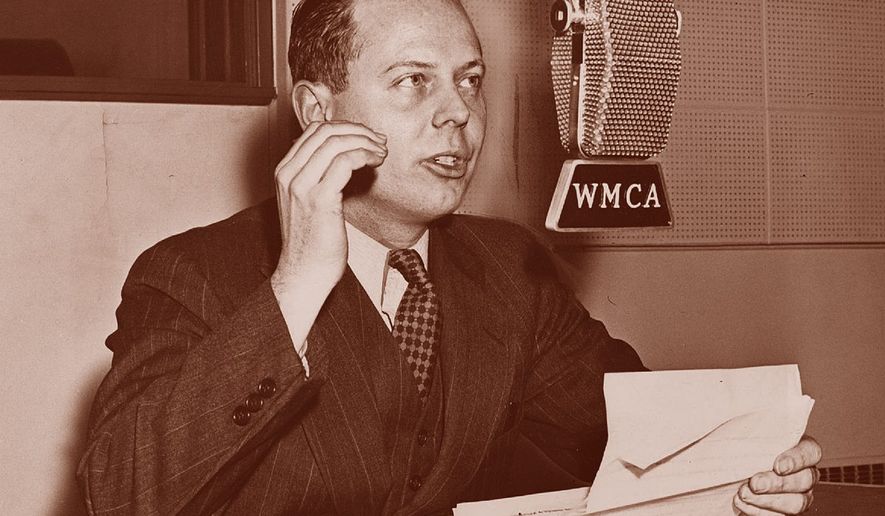OPINION:
Did Russia meddle in the 2016 presidential election?
President Donald Trump emphatically says “no.” But the hierarchy of the U. S. intelligence community is equally firm in saying “yes.” With three probes in progress — two by Congress, another by an independent counsel — an answer perhaps will eventually be found.
But such Moscow meddling would not be without precedent Documents from the archives of the Russian spy agency NKVD — later the KGB — detail a communist attempt in 1938 to unseat U.S. Rep. Howard W. Smith, who represented the 8th Congressional District in Northern Virginia.
Mr. Smith was one of many conservative congressmen who opposed President Roosevelt’s New Deal measures. As a result, the White House targeted them for replacement by reliable liberals.
But Moscow went against Mr. Smith for another reason. He wrote the so-called “Smith Act,” which made it a crime to advocate overthrow of the government by violent means, or to be a member of any group advocating such actions. The primary targets of Mr. Smith and other sponsors were worrisome to Nazi-oriented groups as war loomed in Europe.
But the Communist Party, USA, (CPUSA) was also on their minds. Hence Moscow’s alarm. (More than 100 CPUSA members would be convicted before the U.S. Supreme Court overturned the act. But the party was decimated.)
As their candidate against Mr. Smith in the Democratic primary, the NKVD station in New York chose William Dodd, Jr., son of the U. S. ambassador in Berlin. NKVD files show that journalist I.F. Stone did the recruiting. Mr. Dodd was a sometime-journalist who wrote for several Communist publications, although he would always deny CPUSA membership.
At the insistence of the New York station, Moscow gave Mr. Dodd $1,500 — equivalent to $26,000 today. A receipt was obtained, which meant Mr. Dodd was now in Russia’s hands.
NKVD bosses in Moscow suggested that subsidizing Mr. Dodd could be the first step in a widespread Soviet intervention in American elections. But Peter Gutzeit, the NKVD chief in New York, was not as confident. A serious entry into American politics would require “enormous amounts of money the funding of congressmen’s election expenses, the payment of journalists, the upkeep of newspapers.” Mr. Gutzeit said such costs “are impossible to calculate in advance.” He estimated that a serious intervention could cost $500,000 to $1 million.
But the NKVD took a chance on Mr. Dodd. He ran an energetic campaign, and liberal-leaning publications such as The Washington Post gave him a chance of winning. Bad call. Mr. Smith trounced him by a three to one margin. Mr. Smith would remain in Congress until 1967.
Mr. Dodd apparently made a deep initial impression on his Russian bosses. In what could have been a highly-over-optimistic prediction of his future, he was given the code name of “President.”
In 1939 Mr. Dodd considered making another run against Mr. Smith. As a base he intended to purchase a weekly newspaper, the Blue Ridge Herald. NKVD officers in New York would monitor it closely. As a cable to Moscow stated, “We will work out every detail of the newspaper’s agenda with President [Dodd]. It should not be too left-wing, and it should not be pro-Soviet — nor, it goes without saying, should it be anti-Soviet. A moderately liberal local newspaper with a direct connection to liberal Washington journalists “
Mr. Dodd paid $3,500 for the purchase; the New York KGB upped the ante to $5,000 — the equivalent of $86,803 today. But as matters worked out, Mr. Dodd abandoned politics and did not make the race.
But his service to the NKVD continued. In 1939 the New York station reported he had passed on information from such New Deal Congressional stalwarts as Sen. Claude Pepper of Florida and Representative John Coffee of Washington state. Other information came from the files of his ambassador father.
Meanwhile, sister Martha Dodd made her own contribution to Moscow. Oddly, her Berlin lovers included both prominent Nazi figures and Russian intelligence officers. She eventually married a wealthy American communist figure, Alfred Stern, with whom she lived in exile in Eastern Europe for the remainder their lives.
The NKVD had other hopes for William Dodd, Jr., after his political efforts tanked — perhaps as a commentator in the mainstream media. But the Russians had trouble instilling in him “brutal discipline and the rules of covert work.” He did obtain a wartime job with a U. S. agency that monitored the foreign press. But when he came under investigation the NKVD happily cut him loose.
So, did the Soviets meddle again in 2016? Stay tuned.
Mr. Dodd’s Soviet links are told in thousands of NKVD documents smuggled from the USSR by Alexnder Vassiliev, now deposited in the Library of Congress. His findings are detailed in the 2009 book “Spies: The Rise and Fall of the KGB in America,” which he wrote with John Earl Haynes and Harvey Klehr.
• Joseph C. Goulden writes frequently on intelligence matters.




Please read our comment policy before commenting.